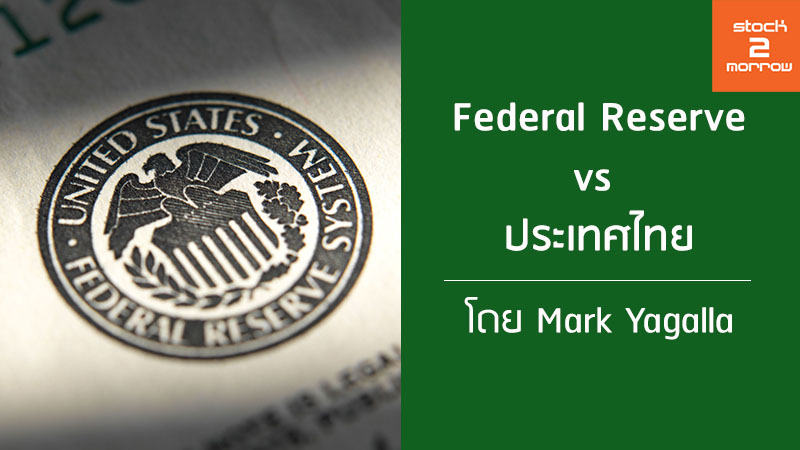.jpg)
บทความโดย Mark Yagalla
แปลโดย สมศักดิ์ ฉายามณีรัตน์
----------------------------------------------------------------------------
บทความต้นฉบับ
While most Thai investors are focused on domestic Thai policies, overseas events
also have a big impact on Thailand, particularly the Baht and Thai stocks. One of the
biggest factors shaping Thailand and the global economy is the US Federal Reserve.
The Federal Reserve System is the central bank of the United States. Its primary
function is conducting monetary policy to promote maximum employment, stable
prices, and moderate long-term interest rates in the U.S. economy. The Fed also
promotes the stability of the financial system and seeks to minimize and contain
systemic risks through active monitoring and engagement in the U.S. and abroad.
The Fed’s monetary policy impacts the US Dollar and that in turn impacts the Thai
Baht. If the Fed is raising interest rates, it’s a sign that the US economy is growing
too fast and the Fed looks to slow it down gradually so as not to create an asset
bubble. With rising interest rates, investors flow to where interest rates are highest
with their money. This leads to heavy US Dollar buying and the selling of other
currencies to buy US Dollars.
Well, how does this affect the Thai stock market?
Since we live in a globalized society where countries are inexplicably linked via
trade, the goal of each country is a weaker home currency. For instance, a weak
Baht is good for Thai exporters as it makes Thai products cheaper on the global
markets. Thai products become cheaper for US consumers to purchase. Conversely,
a strong Baht makes Thai goods more expensive for US consumers. However, it
also makes overseas goods cheaper for Thais as a strong Baht increases Thais’
purchasing power. This also has an adverse effect on Thai stocks as Thai
consumers might instead purchase imported goods over domestic products.
What can Thai investors watch out for?
Investors don’t like surprises. That’s why the Chairman of the Federal Reserve
regularly gives speeches on the Fed’s outlook on interest rates and the global
economy. Since the US is the world’s largest economy, the Fed must consider not
only the health of the US economy, but also overseas since many US companies are
multinationals and conduct business globally.
In a recent interview with CBS News program 60 Minutes, Fed Chair Powell said that
the Fed will remain patient when it comes to raising interest rates further. This comes
after the Fed had raised interest rates four times in 2018. A slowing of interest rate
hikes is bullish for US stocks and global stock markets. Being the world’s largest
economy and stock market, the US leads the world in terms of price action and the
rest of the world follows. As they say, when the US sneezes, the rest of the world
catches a cold.
Bottom Line
It’s quite common for Thai investors to start a new trading day with stocks opening
higher or lower, depending on how the US stock market closed the previous day.
Knowing and understanding what is happening in the US market gives a Thai
investor a better understanding of what’s happening on the SET. These days we are
trading globally even if we are only investing in Thai stocks.


